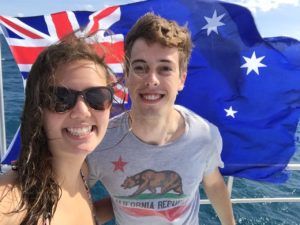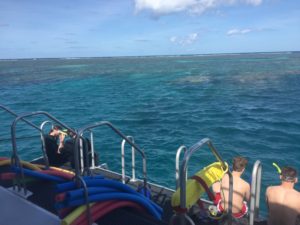Jessica Fong, Arizona State University’s Barrett in Australia student blogger, writes: We are only halfway through our program, and yet have already experienced so much of Australia. On Thursday, our group snorkeled with John Rumney and the staff from Calypso Reef Charters at Opal Reef, which was about an hour and a half by boat from Port Douglas. Opal Reef is only one of 2,900 reefs that make up the entire Great Barrier Reef system. It was a pleasure spending a day on the boat with John and picking his brain on the species of fish and coral that we were seeing out in the water. Yet we didn’t fully realize just how fortunate we were until we talked to locals in Port Douglas and others with an interest in the reef, as everyone was jealous that we spent the day out with such a widely-known, “go-to” expert on the Great Barrier Reef!
In fact, in just a few days, John will be taking BBC documentary filmmakers out on the water for a 9-day expedition. With over 40 years of experience on the reef, John has consulted on international panels for climate change and has launched his own conservation effort to save the reef. Right now, his team is trying to raise money to fund an independent research vessel. If you are interested in learning more about John’s conservation efforts you can go check out his website at: https://www.greatbarrierreeflegacy.org/.
Snorkeling the reef is like nothing I have experienced before. I saw fish with beaks, others with rainbow-colored skin, giant purple clams, and coral as large as couches! Some of my classmates also spotted sharks and octopi. After exploring the reef, it’s obvious that some of these corals have been growing for thousands of years, which is also why it was so sad to see so much of the coral dead or dying. As beautiful as the reef was, you can’t overlook the fact that the warming water has impacted it significantly. Bleaching of coral happens when the water becomes too warm for the coral for an extended period of time. If the water stays warm, the coral will die, but if the water cools down again quickly enough then the coral can recover over time. Before I came on this trip I had read articles that conveyed the Great Barrier Reef was completely dead, but now I know that despite recent serious bleaching events, there is still time to see and save this World Heritage Area!








